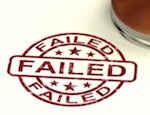Facebook Fail: A Danger Zone for Online Healthcare Advertising
 We'd like to hear about your experience with Facebook ads. The popular social media giant is experiencing considerable challenges in rolling out its advertising revenue model. By many accounts its present form seems to be a Facebook Fail. Has that been your experience?
We'd like to hear about your experience with Facebook ads. The popular social media giant is experiencing considerable challenges in rolling out its advertising revenue model. By many accounts its present form seems to be a Facebook Fail. Has that been your experience?
Holy Timeline, Zuckerberg Fans! Healthcare and hospital marketing and advertising will want to approach Facebook (FB) advertising with caution. The rules of the road are likely to change as FB works its way through these problems.
Here's the picture…and why you should approach with care before becoming a "friend" of Facebook Advertising.
- Facebook's advertising model is complicated and cumbersome. Among other things, the FB ad technology offers the potential advertiser with more than 30 kinds of ad options that are confusing and unwieldy to use. So much so, according to the Los Angeles Times, "Facebook gives marketers the ability to slice their target audience into hundreds or thousands of tiny slivers based on age, location, hobbies and preferences—and to alter campaigns on the fly based on which groups are the most responsive."
- FB advertising has been a poor performer. With 900-million users online, it would seem like a can't-miss proposition…but the performance numbers don't hold up. The metrics say that only about 1 in 2,000 FB visitors click on the average display ad. That's a worse track record than the average Internet display ad, and considerably worse performance than traditional (unsolicited) bulk mail ads.
- Major advertisers and corporate brands have pulled back for reassessment. "[Analysts] say most advertisers are still at a loss about how to wring a profit from Facebook advertisements, according to the Times article. "General Motors Co. stopped trying altogether, deciding to stop paying for ads on the social network."
- A Facebook Fan Page for Business is also a mixed bag. The good news is that businesses can post an advertising message on their own Fan Page where they don't have to pay for it. The trouble is, heavy-handed self-promotion comes with a potential penalty; it can cause people to "unfriend" your page. GM, says the Times, "decided to forgo paying for ads and focus on beefing up its Facebook pages promoting various GM vehicles, which draw millions of followers. But analysts say that, like GM, many companies that have built large Facebook audiences are still at a loss about how to turn that attention into profit."
- There's good news and bad news about all those mobile users. The mainstream adoption of smartphones and tablets means even more FB users, but the screen is shrinking for many visitors. Mobile media is quick and convenient for the user, but the smaller screen real estate offers less space for advertising than a desktop or laptop screen.
What this means for healthcare and medical advertising…
These issues are of considerable concern to Facebook as well as to prospective hospital and healthcare advertisers. In the near term, here's some food for thought:
- Facebook, and Facebook advertising, isn't going away. Although it's reasonable to think that uncertainties about the company's advertising model may have put a damper on it's recent IPO, it is a multi-billion dollar social networking powerhouse. It's highly likely that, sooner or later, the company will find a better formula for ad revenue. In the near term, however, if GM and other major brands are on the sidelines, a wait-and-see stance might be prudent.
- FB advertising isn't remotely the same strategy as Google AdWords. These two options are fundamentally different in concept. Unlike Google (a search platform), people are not looking for specific services, products and ads when they use Facebook (a social interaction platform.) Consequently, FB users tend to be attracted to the content where they have a personal connection and ignore the paid advertising that is unrelated to their visit.
- In social media, one approach does not fit all. Notwithstanding that Facebook advertising mechanics have confounded major advertisers, healthcare marketing professionals need a deep understanding of each platform and the considerable differences that are in play. It is this awareness that will identify the most effective options within a social media strategy.
If you have been using Facebook for medical practice or hospital advertising, please let us know how about your experience. And if you are struggling with the challenges of FB advertising, tell us about how you handled the issues.









